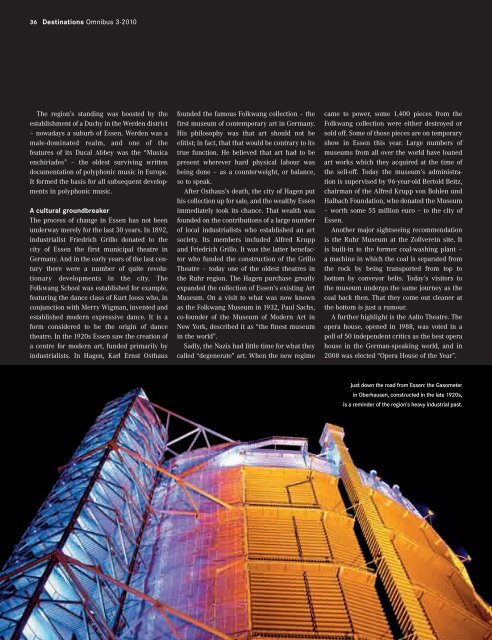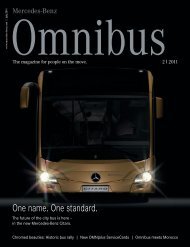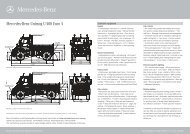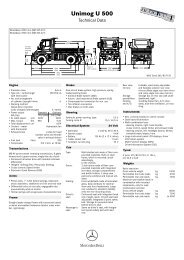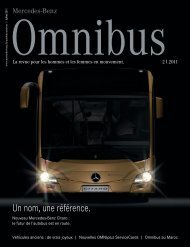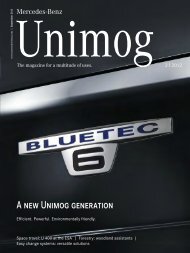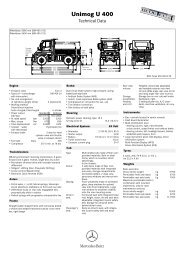magazine 2010/3 - Mercedes-Benz UK
magazine 2010/3 - Mercedes-Benz UK
magazine 2010/3 - Mercedes-Benz UK
You also want an ePaper? Increase the reach of your titles
YUMPU automatically turns print PDFs into web optimized ePapers that Google loves.
36 Destinations Omnibus 3·<strong>2010</strong><br />
The region’s standing was boosted by the<br />
establishment of a Duchy in the Werden district<br />
– nowadays a suburb of Essen. Werden was a<br />
male-dominated realm, and one of the<br />
features of its Ducal Abbey was the “Musica<br />
enchiriades” – the oldest surviving written<br />
documentation of polyphonic music in Europe.<br />
It formed the basis for all subsequent developments<br />
in polyphonic music.<br />
A cultural groundbreaker<br />
The process of change in Essen has not been<br />
underway merely for the last 30 years. In 1892,<br />
industrialist Friedrich Grillo donated to the<br />
city of Essen the first municipal theatre in<br />
Germany. And in the early years of the last century<br />
there were a number of quite revolu -<br />
tionary developments in the city. The<br />
Folkwang School was established for example,<br />
featuring the dance class of Kurt Jooss who, in<br />
conjunction with Merry Wigman, invented and<br />
established modern expressive dance. It is a<br />
form considered to be the origin of dance<br />
theatre. In the 1920s Essen saw the creation of<br />
a centre for modern art, funded primarily by<br />
industrialists. In Hagen, Karl Ernst Osthaus<br />
founded the famous Folkwang collection – the<br />
first museum of contemporary art in Germany.<br />
His philosophy was that art should not be<br />
elitist; in fact, that that would be contrary to its<br />
true function. He believed that art had to be<br />
present wherever hard physical labour was<br />
being done – as a counterweight, or balance,<br />
so to speak.<br />
After Osthaus’s death, the city of Hagen put<br />
his collection up for sale, and the wealthy Essen<br />
immediately took its chance. That wealth was<br />
founded on the contributions of a large number<br />
of local industrialists who established an art<br />
society. Its members included Alfred Krupp<br />
and Friedrich Grillo. It was the latter benefactor<br />
who funded the construction of the Grillo<br />
Theatre – today one of the oldest theatres in<br />
the Ruhr region. The Hagen purchase greatly<br />
expanded the collection of Essen‘s existing Art<br />
Museum. On a visit to what was now known<br />
as the Folkwang Museum in 1932, Paul Sachs,<br />
co-founder of the Museum of Modern Art in<br />
New York, described it as “the finest museum<br />
in the world”.<br />
Sadly, the Nazis had little time for what they<br />
called “degenerate” art. When the new regime<br />
came to power, some 1,400 pieces from the<br />
Folkwang collection were either destroyed or<br />
sold off. Some of those pieces are on temporary<br />
show in Essen this year. Large numbers of<br />
museums from all over the world have loaned<br />
art works which they acquired at the time of<br />
the sell-off. Today the museum’s administration<br />
is supervised by 96-year-old Bertold Beitz,<br />
chairman of the Alfred Krupp von Bohlen und<br />
Halbach Foundation, who donated the Museum<br />
– worth some 55 million euro – to the city of<br />
Essen.<br />
Another major sightseeing recommendation<br />
is the Ruhr Museum at the Zollverein site. It<br />
is built-in to the former coal-washing plant –<br />
a machine in which the coal is separated from<br />
the rock by being transported from top to<br />
bottom by conveyor belts. Today’s visitors to<br />
the museum undergo the same journey as the<br />
coal back then. That they come out cleaner at<br />
the bottom is just a rumour.<br />
A further highlight is the Aalto Theatre. The<br />
opera house, opened in 1988, was voted in a<br />
poll of 50 independent critics as the best opera<br />
house in the German-speaking world, and in<br />
2008 was elected “Opera House of the Year”.<br />
Just down the road from Essen: the Gasometer<br />
in Oberhausen, constructed in the late 1920s,<br />
is a reminder of the region’s heavy industrial past.


